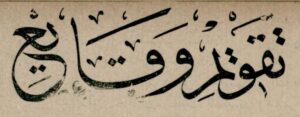Takvim-i Vekayi
The Calendar of the Ottoman and Turkish Studies Virtual Events Communication Platform
If you are interested in submitting your events to be posted on this platform’s calendar, the Takvim-i Vekayi, please fill out this form and e-mail it to osta.webmaster@gmail.com and otsa.webeditor@gmail.com copying secretariattsa@gmail.com at least ten days before your event. The form will be processed within a week of receipt. We are grateful to our volunteer webmaster, Gharam Alsaedi, a UC Davis Computer Science senior, and our volunteer web editor Molly Powers, a UC Davis junior double majoring in International Relations and History, for their work on the Takvim-i Vekayi and to Professor Carole Woodall for her initiative in creating this calendar.
[NYU Kevorkian Center] Center for the Study of Gender and Sexuality Event
QUEER DIASPORIC VISUAL ART: ISLAMICATE CONTEXTS Speakers: Alireza Shojaian, Laurence Rasti, Sarp Kerem Yavuz Abstract: This panel explores questions of queerness and diaspora through the lens of visual art. CSGS Visiting Scholar Dr. Andrew Gayed will be in conversation with acclaimed contemporary artists Alireza Shojaian, Laurence Rasti, and Sarp Karem Yavuz. Turkish artist Sarp Karem Yavuz […]
[Keyman Modern Turkish Studies Program] – Spring Quarter Article workshop Call for Applications – March 12 th Deadline
The Keyman Modern Turkish Studies Program at Northwestern University’s Buffett Institute of Global Affairs continues its year-long series of virtual workshops to support early career scholars preparing an article for publication by a peer-reviewed journal. The spring sessions will begin in April 2021. To be considered for the first round submit your application, including a […]
[Northwestern Univ. Keyman Modern Turkish Studies Program] Visiting Speaker Dr. Baki Tezcan – The emasculated guardians of power: Black eunuchs and the interplay between gender and race at the Ottoman imperial court
In the light of four books that were either written with a view to secure the patronage of the Chief Black Eunuch of the Ottoman court, or to critique him, between the early seventeenth and mid-eighteenth centuries, Dr. Tezcan will discuss Ottoman literary representations of Africans and how these representations intersect with the heavily gendered […]
[University of Michigan Global Islamic Studies Center] IISS Lecture. The “Talisman of the World”: Mawlāna Jalāl al-Dīn Rūmī and the Mongols in 13th-Century Seljuk Anatolia by Sara Nur Yildiz (Berlin)
Mawlānā Jalāl al-Dīn Rūmī (d. 1274), the Sufi shaykh and poet celebrated for his mystical Mathnawi, rose to prominence during a particularly turbulent period as Mongol rule was imposed upon Seljuk Anatolia. While partisan arguments abound in modern Turkish historiography whether he was a collaborator with the Mongol invaders or not, Mawlana’s social and political […]
[OTSA] Habits of the Market: Commercial Networks, Regional Finance, and Resistance in the Ottoman Tobacco Trade (c. 1858-1912) with Kaleb Herman Adney and Eyal Ginio
Our W’OTSAp (What is up in Ottoman and Turkish Studies?) meeting in March features the winner of the 2020 Vangelis Kechriotis Memorial Travel Grant, Kaleb Herman Adney (UCLA). Herman’s dissertation project, Habits of the Market: Commercial Networks, Regional Finance, and Resistance in the Ottoman Tobacco Trade (c. 1858-1912), examines the political economy of tobacco in […]
[Columbia Global Centers Istanbul] Ishtar Diaries Podcast Series (Episodes will be released bi-weekly)
Ishtar Diaries is a podcast at the intersection of scholarly studies of the ancient world, contemporary social and political conditions, and the speakers’ personal experiences. It revolves around Ishtar, an ancient Mesopotamian goddess, and her diaries as inscribed on ancient Near Eastern material culture. Her diaries are in a state of continuous becoming. As we […]
[UT Austin Turkish Literature in Translation Reading Group] The Stone Building and Other Places by Aslı Erdoğan
Turkish Literature in Translation Reading Group: The Stone Building and Other Places by Aslı Erdoğan with translator Dr. Sevinç Türkkan. Meeting via Zoom.
[Columbia Global Centers Istanbul] The Making of “Europe Knows Nothing About The Orient”
Following the conversation on the content and context of Europe Knows Nothing About the Orient, this panel will discuss the complex production of the book from its early inception through the final translation. Speakers: Prof. Zeynep Çelik Aron Aji Ayşen Gür Rana Alpöz Sibel Doğru Registration Link here. More information here.
[UIO – Department of Culture Studies and Oriental Languages] Turkish Kaleidoscope: Joining Art and Science
A seminar with Professor Jenny White. It is 1975 and Turkey is near civil war. Four medical students struggle on opposing sides in a society torn apart by violent political factions. Each has a different reason for joining the cause, with consequences that follow them into the present. Turkish Kaleidoscope, a graphic novel by Jenny White […]
[Remembering and Coexisting in the Eastern Mediterranean] Thessaloniki Workshop
Unspoken memories, unwritten histories: Eastern Mediterranean pluralism in oral history and memory studies A series of workshops devoted to theory and practice in academia and civil society Less than a hundred years ago, most Eastern Mediterranean cities were marked by a high degree of cultural pluralism. Whereas the dissolution of the Ottoman Empire and the […]
[UC Berkeley Eastern Mediterranean Studies Initiative] Geographies and Histories of the Ottoman Supernatural Tradition with Marinos Sariyannis
Exploring Magic, the Marvelous, and the Strange in the Ottoman Mentalities Dr. Marinos Sariyannis (ERC Grant 2017- 2023)
[Northwestern Univ. Keyman Modern Turkish Studies Program] Visiting Speaker Dr. Ezgi Guner: Scramble for African Hearts: Muslim Whiteness, Islamic Civility, and Interracial Intimacy in AKP’s Turkey
Drawing on a multi-sited ethnography in Turkey, Tanzania, Senegal, Gambia, and Benin, Dr. Guner shows how whiteness, historically associated with Western modernity and state secularism in Turkey, is redefined as the marker of Islamic civility in and through these transnational relations. Analysis of the construction of Muslim whiteness contributes to debates on intersectionality of race […]
